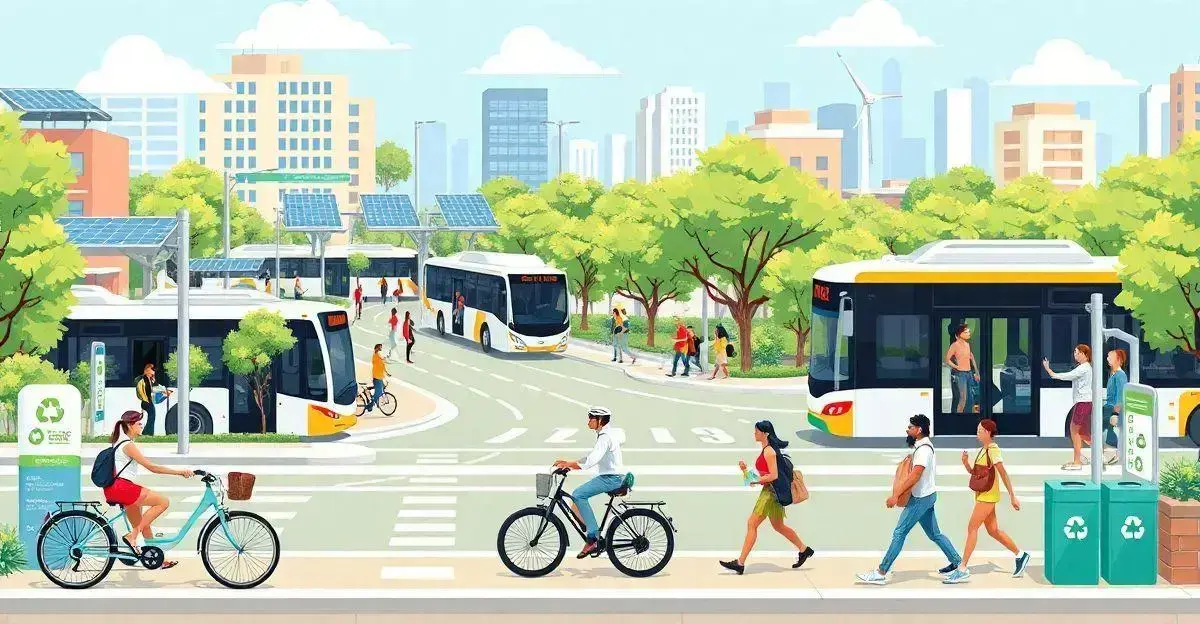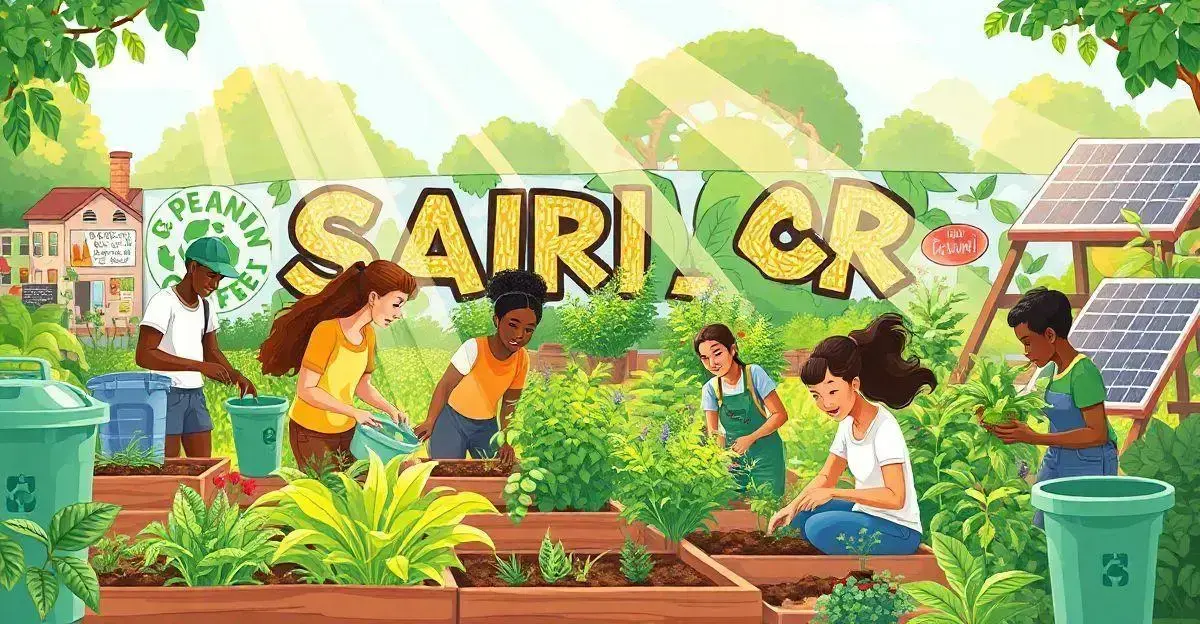Sustainable living tips are essential for anyone looking to reduce their environmental impact. Adopting these simple steps can contribute significantly to a greener planet.
Understanding Sustainable Living
Understanding sustainable living is crucial for those who wish to make a positive impact on the planet. It involves making conscious choices that contribute to the health of the environment. Some key principles of sustainable living include reducing waste, conserving water, and using energy-efficient appliances.
For instance, reducing waste can be achieved by recycling and composting. Instead of throwing away food scraps, you can create a compost bin to enrich your garden soil. This not only minimizes landfill waste but also promotes healthy plant growth.
Another important aspect of sustainable living is conserving water. Simple actions like fixing leaks, taking shorter showers, and using water-saving fixtures can greatly reduce water consumption. Every drop counts, and by making small changes, you can help preserve this vital resource.
Additionally, embracing renewable energy sources, such as solar or wind power, can significantly reduce your carbon footprint. Investing in energy-efficient appliances also contributes to lower energy consumption, which is beneficial for both your wallet and the environment.
Ultimately, understanding sustainable living encourages us to make choices that protect our planet for future generations. By adopting these practices, we are not only improving our own lives but also contributing to a healthier world.
Benefits of Sustainable Living

The benefits of sustainable living are numerous and can greatly enhance your lifestyle. Firstly, adopting sustainable practices helps reduce pollution and conserves natural resources, which is vital for the health of our planet. By recycling, using public transport, and reducing energy consumption, individuals can significantly lower their carbon footprint.
Moreover, sustainable living promotes healthier choices. For instance, choosing organic and local foods reduces the reliance on chemical pesticides and supports local economies. By eating fresh, seasonal produce, you not only contribute to sustainability but also improve your health.
Another key benefit is cost savings. Investing in energy-efficient appliances, solar panels, and water-saving fixtures can lower utility bills over time. These initial investments often pay for themselves through reduced expenses.
Sustainable living also fosters a sense of community. Engaging in local sustainability initiatives, such as community gardens or clean-up events, connects you with like-minded individuals, fostering relationships built on shared values.
Lastly, embracing sustainability instills a sense of purpose. Knowing that your choices contribute to a healthier planet can be incredibly fulfilling. It empowers individuals to make a positive difference, inspiring others to follow suit.
Practical Tips for a Greener Home
Practical tips for a greener home can make a big difference in your environmental impact. One of the simplest changes you can make is to switch to energy-efficient light bulbs. These bulbs not only last longer but also use less electricity, reducing your energy bill and carbon footprint.
Another effective tip is to practice water conservation. Fixing leaks, installing low-flow fixtures, and using rainwater for gardening are all excellent ways to save water. Every little effort adds up!
Additionally, consider using natural cleaning products instead of harsh chemicals. Many household items like vinegar and baking soda can effectively clean your space without contributing to indoor pollution.
Involve your household in recycling efforts. Set up separate bins for paper, plastic, and organic waste to encourage everyone to participate. This not only promotes recycling but also teaches others about the importance of reducing waste.
Composting is another great practice to implement at home. It transforms kitchen scraps into rich soil for your garden, reducing what goes to landfills. This natural fertilizer helps promote healthy plant growth while reducing waste.
Finally, consider planting native gardens. Native plants require less water and are more resistant to pests, making them an easy way to maintain a beautiful yard while also supporting local wildlife.
Sustainable Transportation Options

Sustainable transportation options are essential for reducing our carbon footprint and promoting a healthier planet. One of the most effective ways to lower emissions is by using public transport. Buses and trains can carry many passengers at once, which decreases the number of individual vehicles on the road.
Biking is another excellent way to travel sustainably. Not only does it reduce pollution, but it also provides a great workout. Many cities are investing in bike lanes to make cycling safer and more accessible for everyone.
Walking is the simplest form of sustainable transportation. For short trips, choosing to walk instead of drive helps to reduce emissions and allows you to enjoy your surroundings. Encouraging walking by creating pedestrian-friendly areas in cities can make a big difference.
Carpooling is also an option worth considering. By sharing rides with others, you can significantly cut down on the number of vehicles on the roads, which helps to lower traffic congestion and air pollution.
Electric vehicles (EVs) are a growing trend in sustainable transport. They produce zero emissions when running and can be powered by renewable energy sources, making them a smart choice for eco-conscious drivers.
Finally, using car-sharing services allows you to access a vehicle when you need it without the cost and responsibility of ownership. This reduces the overall number of cars on the road, making transportation more efficient.
Reducing Waste in Daily Life
Reducing waste in daily life is essential for promoting a sustainable environment. One of the most important methods is to adopt a minimalist lifestyle. By focusing on purchasing only what you need, you can reduce clutter and waste.
Another effective strategy is to use reusable bags for shopping. Instead of relying on single-use plastic bags, bring your own fabric or jute bags. This small change can significantly decrease plastic waste.
Composting is a great way to manage organic waste. Instead of throwing away food scraps, you can compost them to create nutrient-rich soil for your garden. This not only reduces waste but also promotes healthy plant growth.
Buying in bulk is another excellent practice. Purchasing items like grains, spices, or snacks in larger quantities can reduce packaging waste and save money in the long run. Always carry your own containers when shopping.
To further reduce waste, consider donating or recycling items you no longer use. Many charities accept clothing, furniture, and other household goods. Recycling helps keep materials out of landfills and allows them to be repurposed.
Lastly, be mindful of your food consumption. Keep track of what you have in your pantry to avoid buying duplicates. Planning meals can help ensure you use ingredients before they spoil, decreasing food waste.
Community Initiatives for Sustainability

Community initiatives for sustainability play a vital role in fostering healthy environments. These local projects often aim to engage citizens in making their surroundings better.
One common example is community gardens, where people can come together to grow fresh produce while promoting green spaces. Such gardens not only provide food but also help to build social connections among neighbours.
Another initiative involves local clean-up days. Residents can join forces to pick up litter from parks and streets, enhancing the area’s appearance and reducing pollution. These events often raise awareness about the importance of keeping our surroundings clean and encourage a sense of responsibility.
Recycling programmes are also essential. Many communities organise educational workshops to teach residents how to recycle properly. By increasing knowledge around recycling, communities can minimise waste that goes to landfills.
Some areas introduce energy-saving campaigns, where residents are encouraged to adopt energy-efficient appliances and practices. Offering resources and incentives can inspire others to save money while reducing their carbon footprint.
Additionally, some communities create platforms to support local businesses that practise sustainability. These initiatives often foster a sense of pride and encourage residents to shop locally, benefiting both the economy and the environment.
Overall, community initiatives for sustainability empower individuals to make a meaningful difference while bringing people together to collectively work towards a healthier future.
The Path to Sustainable Living
Adopting sustainable practices is a journey that benefits both individuals and the planet. By making conscious choices, we can significantly reduce our impact on the environment.
Simple actions, such as using public transport, embracing minimalism, and engaging in community initiatives, create a ripple effect that encourages others to follow suit.
Our collective efforts, whether through composting, reducing waste, or supporting local businesses, contribute to a healthier and more sustainable future.
It is crucial to inspire those around us to take part in these initiatives, as every small step counts.
Ultimately, the journey towards sustainability is about creating a better world for ourselves and future generations. Let us work together towards this important goal.
Check out our article on 5G Networks to learn about its benefits and how it’s transforming connectivity worldwide.
